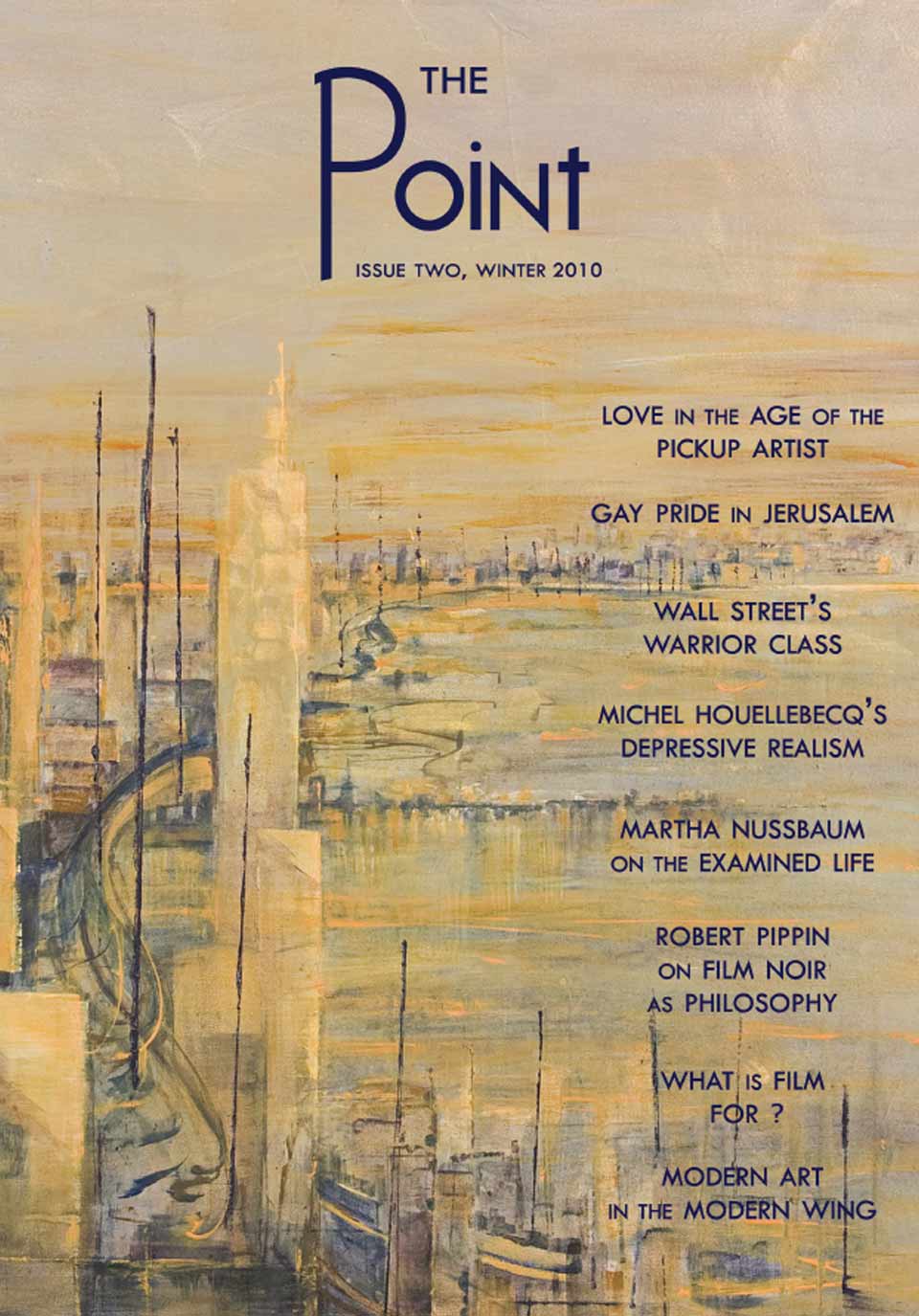Yet the true city, in my view, is the one we have described: the healthy one, as it were. But if you also want to look at a feverish city, so be it. —Socrates, in Plato’s Republic
At the best of times, Wall Street provides white noise amidst entrepreneurs’ and workers’ attempts to actualize their ambitions and projects. We are still learning what happens at the worst of times.
The night of March 19th, 2003, I was alone in the lounge of my college dorm, watching the TV and waiting for bombs to begin […]
Michel Houellebecq has published four novels, all of them bitter and miserable. Their pessimism isn’t the only thing to them, or necessarily the most important thing, but it is probably the first that you’ll notice.
I first turned to the pickup artists after losing in love. Or, to be precise, winning—and then losing.
“The Man Who Shot Liberty Valance” was born old. With its black-and-white photography and its backlot sets, its aging stars incongruously cast as young men, its barnstorming turns by John Carradine and Edmond O’Brien, it seemed like a movie from another time.
The thought occurs to the viewer that Holly is already in her magical land, if only she could see it. But she would have to see it from our perspective—the perspective of Malick’s camera.
The Iranian director Abbas Kiarostami has repeatedly said he enjoys it when audiences fall asleep during his films. This might explain his relative anonymity in America. After all, we’ve been told to go to movie theaters for escapism, thrills, adventures, stories.
Lynch’s career as a filmmaker is unique. He is one of the few directors dominantly influenced by inner processes and unconscious insights. When asked about his approach in his latest project, Inland Empire, Lynch said, “It’s a risk, but I have this feeling that because all things are unified ...
The best word I’ve come across to describe David Cronenberg’s filmmaking style is “disembodied.” It was voiced as a criticism, but I think he’d own up to it. Whatever squelchy or peculiar or downright disgusting thing is going on in his pictures, the camera tends to exhibit an almost serene, floating detachment, like a severed head calmly looking down at its own twitching torso.
There is something very striking about the mises-en-scène, the characters and the plot developments in the genre (a disputed classification) or historical cycle (by rough consensus 1941-1958) known as “film noir.” With respect to virtually any significant or pivotal action treated in many of these films (things like murdering someone or cheating on a spouse or informing on a confederate or committing suicide), almost no one in noirs behaves in a way that easily fits the reflective and deliberative models of action and agency prominent in philosophy since Aristotle.
Classics, the: force of oppression. Know enough to despise ~: “Plato was an authoritarian.” “Aristotle condoned slavery.”
Even for many of us who didn’t go to high school in the Midwestern suburbs, this is the vision of high school we carry in our collective memory. I can immediately recognize the image of a senior prom or the inside of a suburban high school not because I have ever been to either, but because I have seen The Breakfast Club and Pretty in Pink more times than I can count.
Gay Pride marches are generally pretty fun. So I was expecting a carnival atmosphere, lots of rainbow stripes and at least a bubble machine or two at Israel’s second largest annual parade. Rainbow stripes there were, but not much else was familiar...
The chronological method generates a more flexible matrix capable of displaying the complex, and often contradictory, logic of twentieth-century art. Rather than stylistic or thematic development, it is incidental temporal progression that threads the exhibition rooms together, producing a space in which an open-ended conversation is carried out between different modes of the modern.
The editor has claimed the issue will be successful if it gives its readers a feel for “exactly what the city is like,” although it should also succeed as a “work of art.” The question of whether literature with the same aspirations as tourism could qualify as art is not asked by Granta’s Chicago issue, although it is answered by it.
A world utterly without “why” can have one or the other of two very different aspects. It can seem a deeply contemplative, even if not necessarily thoroughly pleasant, place.
Blending lyrical melancholy with sharply absurdist wit, the play hunts avidly after the conditions of significant action and utterance even as it toys with the possibility that none exist. The play’s central conceit concerns the diary that Faustus has kept during the decades of his infernal bargain; madly, in order to thwart the demon’s interest in reading his most intimate thoughts, the doctor has resorted to inscribing nothing but random groupings of hatchmarks in his book.
Portraying philosophers as authority figures is a baneful inversion of the entire Socratic process, which aimed to replace authority with reason.
“Examined Life” cannot be a model for the serious yet popular philosophy we crave. But perhaps its most successful moments point to someone who can.
